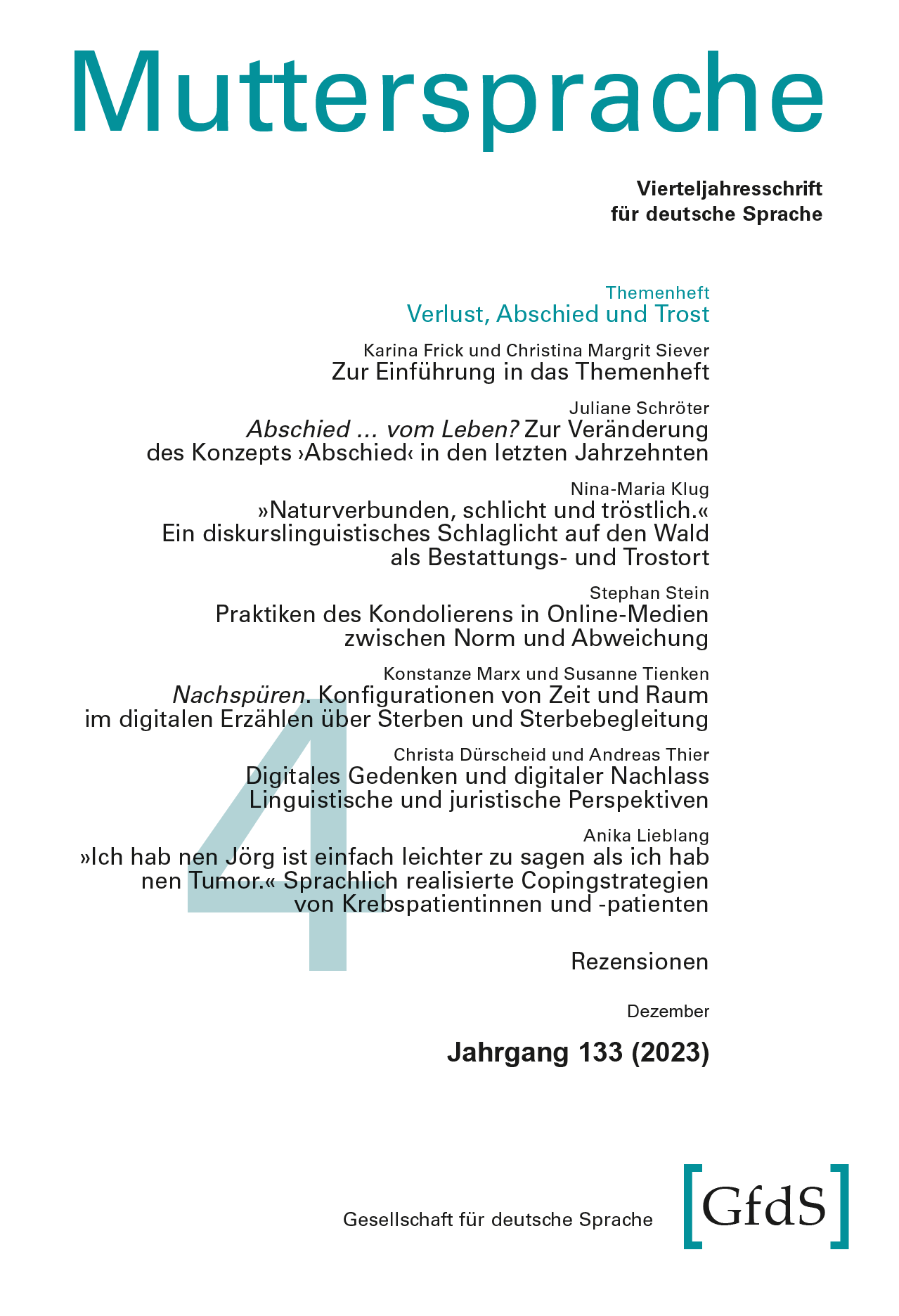Artikeldetails
freier Zugang*Anika Lieblang: »Ich hab nen Jörg ist einfach leichter zu sagen als ich hab nen Tumor.«Sprachlich realisierte Copingstrategien von Krebspatientinnen und -patienten in digital illness narratives (MU)
(Verlust, Abschied und Trost)

Produkttyp: Beitrag (Zeitschrift)
Autor(in): Anika Lieblang
Titel: »Ich hab nen Jörg ist einfach leichter zu sagen als ich hab nen Tumor.«Sprachlich realisierte Copingstrategien von Krebspatientinnen und -patienten in digital illness narratives
Publikation in: Muttersprache, 133. Jahrgang, Heft 4
Seiten: 373–380 (8 Seiten)
Erschienen: 15.12.2023
Abstract: siehe unten
URI: https://doi.org/10.53371/61058

Preis: kostenfrei
(Download)
Abstract
Durch die gewachsene Bedeutung der Psychoonkologie ist das Themenfeld der Krankheitsverarbeitung (Coping) vermehrt in das Blickfeld der Forschung gerückt. Gleichzeitig entstehen im Web 2.0 neue digitale Formen der intermedialen narrativen Repräsentation von Krankheit, Leid und Krankheitsbewältigung (Cybercoping), wodurch sich für Betroffene neue Möglichkeiten eröffnen, eine Erkrankung durch medienvermittelte Kommunikation und Vergemeinschaftung zu bewältigen und sich eine soziale Identität als chronisch Kranke zu verleihen (vgl. Deppermann 2018). Der Beitrag präsentiert auf theoretischer Basis der Copingforschung sowie der Gesprächsforschung zu narrativer Identitätsbildung eruierte Copingstrategien in Krankheitsnarrativen von Krebspatientinnen und -patienten. Coping wird als kommunikativer Prozess verstanden, der sich in Sprachhandlungen widerspiegelt. Das Untersuchungsmaterial bilden autobiografische Erzählungen in Internetvideos, öffentlich geteilt von zwanzig Betroffenen auf der Social-Media-Plattform YouTube. Copingmechanismen werden in den untersuchten Narrativen in Form von emotionsgeladenen Sprachäußerungen und humoristisch bzw. ironisch gefärbten Sprachhandlungen zur Emotionsregulierung und Entlastung sowie in Gestalt von metaphorischen Deutungsmustern und Personifizierungen der (Tumor-)Erkrankung angezeigt. In den Sprachhandlungen der Erzählenden wird aktives problemorientiertes Coping durch sich selbst und die Community aktivierende Sprache, eine häufig agentivische Selbstdarstellung und -positionierung der Betroffenen und eine durch Positivierung und Neubewertung sinnstiftende Kohärenz sichtbar.
Due to the growing importance of psycho-oncology, coping as a mechanism has increasingly gained relevance in research. At the same time, new digital forms of intermedial narrative representation of illness, suffering, and coping emerged in Web 2.0 (cybercoping). This opens up new possibilities for those affected as they can cope through digitally mediated communication in communities and thereby give themselves a social identity as chronically ill persons (cf. Deppermann 2018). On the theoretical basis of coping research and conversation analytical research on narrative identity formation the paper illustrates coping strategies and mechanisms identified in illness narratives of cancer patients. This is based on the assumption that coping is a communicative process that can be reflected in speech acts. The research material consists of autobiographical narratives from twenty affected people in internet videos, publicly shared on the social media platform YouTube. In the narratives, coping mechanisms are displayed in form of emotionally charged speech and humorous or ironic speech acts in order to regulate or relief emotion. Moreover, metaphorical interpretation patterns and personifications of the (tumor) disease can be observed. In the narrators’ speech acts, active problem-oriented coping becomes visible through self- and community-activating speech, a frequent self-representation and self-positioning of the affected persons as active agents and through positivity and re-evaluation of meaning-giving coherence.
*Open Access gemäß CC BY-NC-ND 4.0.